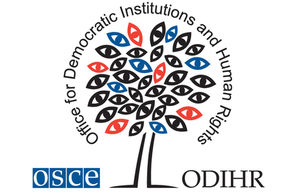UK statement to the OSCE Human Dimension Implementation Meeting (Working Session No.12 and 13)
"Ensuring that basic human right - that all citizens should be able to live their lives free from targeted abuse such as hate crime."

ODIHR logo
OSCE Human Dimension Implementation Meeting, Warsaw, Poland
Thursday, 29 September 2015
We fully support the statement delivered by Italy on behalf of the EU and its member states and would like to make some national remarks.
The United Kingdom is committed to promoting and protecting human rights for all, without discrimination on any grounds. Indeed we believe that a State’s willingness to protect its minority communities is one of the best indicators of a thriving democracy: No one should suffer hostility because of their personal characteristics, whether that be race, religion or belief, sexual orientation, disability or gender identity.
We want to congratulate ODIHR for their continued work in supporting States to combat hate crime. In order to ensure consistency across the region we would wish to encourage its continued cooperation with other international actors, including the Council of Europe and the European Commission.
We look forward to considering the next update of the hate crime annual data website in November, including data for 2014. The data from 2013 again highlighted a huge disparity of responses from participating states, particularly in the recording of hate crime and the transparent publication of such data. It is perhaps counterintuitive to celebrate greater numbers of hate crimes in any state but we know that, even in the UK, with its relatively high figures, most crimes are never reported to authorities. This is why we use household surveys to assess the true experiences of victims and to assess the progress against our key objectives - to reduce the overall incidence of hate crime but to close the gap between experienced and recorded hate crime.
We would congratulate those States whose recent work to improve data systems lead, in 2013, to notable leaps in published data and we would encourage all states to ensure that we continue to see such improvements in their own contribution to the ODIHR report.
The challenges we face in reducing the harm caused by hate crime are perhaps greater now than they have been for some considerable time. The analysis of our data has shown us that events around the world fuel hostility and hatred within the United Kingdom and we have seen retaliatory action that has lead to attacks on innocent victims in response to events in other parts of the world, both in and outside the OSCE region. In 2014 and 2015 this threat has been felt most strongly in our Jewish and Muslim communities. The robust data collected by the police in the UK allows us to effectively assess risk and put in place preventative measures to help reduce this harm and to bring perpetrators to justice. However the police cannot effectively operate in isolation and a key strand of the UK response is to form effective relationships with civil society groups.
Building relationships with trustworthy organisations is an integral part of the UK response as we know that many victims would report to a third party organisation but not to the police. We should all embrace these trusted partnerships and I would wish to highlight the success of two such relationships in the UK. For some time the police have worked closely with the Community Security Trust and Tell MAMA who work to protect the Jewish and Muslim communities. They are an integral part of our response, both in terms of informing policy and providing an accurate picture of the experiences of the communities they serve.
Earlier this year the police agreed a national data sharing agreement with these two organisations which allows for the free flow of information with the victim’s consent but also for the anonymised recording of crime when this is the victim’s desire. The information exchange agreements are published on “True Vision” the police’s hate crime web facility.
The regular exchange of information and joint analysis of data is important but the agreement also provides an early warning of the increases in community tension, to allow effective responses to be swift and better informed.
The increased numbers of distressed refugees entering the OSCE region as they flee hostility elsewhere presents significant humanitarian challenges for participating states. Sadly it also provides new high profile targets for those individuals and groups who incite hatred. As we rightly concentrate on the humanitarian responses to this situation it is vital that we also consider responses to reduce the harm caused by the hostility to their presence in our region.
In concluding we encourage participants to rise to the challenges that we all face in ensuring that basic human right - that all citizens should be able to live their lives free from targeted abuse such as hate crime.